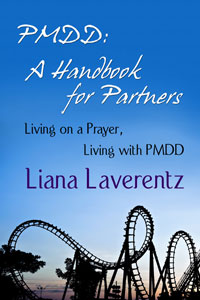So what did I do two weeks ago when I was hit with my latest double header? (And yes, that means I am in the throes of another one now -- right on schedule.) I worked, I wrote, and I slept. (Three hour naps are not unusual when my hormonal system gets so far out of whack.) I just pared my life down to the bare bones, ate take-out from the Whole Foods Co-op or heated up all-natural frozen entrees, focused on my work (I work at home, due in part to my PMDD), and wrote my heart out. Took a walk when I needed a boost in my serotonin level. Took time out for me.
But I didn’t do any of that until I finally admitted that I was having a problem. And so, it got me to thinking. Why was it that I waited so long to admit my PMDD was acting up again? Why was I so deep in denial? Because I had work to do, a schedule to maintain, a life to live. I didn’t have time to give in to some strange, intangible brain disorder that keeps me from getting the things done I wanted to get done. I wanted to be normal.
PMDD women want to be normal more than anything else in the world. We don’t want to admit there’s something going on in our brains that just isn’t quite right. Something that even the medical professionals can’t agree on, much less define. We can find a thousand excuses for why we are so clumsy at times, or so ravenous, or irritable, edgy, disoriented, anxious, or weepy. We deny and deny and deny there is anything wrong with us, or that we are in any way acting strangely, because to admit that we are doing so means we will have to stop and deal with it somehow, and how can you deal with something that defies description?
Somehow we’ve convinced ourselves it’s just easier to ignore the symptoms we can’t explain and plow onward. Because that’s what women do. We just keep going until we can’t go any more. PMDD women are especially strong and stubborn in this regard. We go and go and go until we collapse. Or until our behavior becomes so erratic that someone in our life can’t stand it anymore and says, “What’s wrong with you?”
Even then we deny it. There’s nothing wrong with me. If you’d just pick up your clothes, fix the faucet, turn down the TV, do your homework, call me, stop calling me, show up on time, take the trash out, talk to your parent/child/boss/sibling, move your car, paint the bedroom, fill out the report, do what I ask, everything would be fine. The problem is you, not me. You’re what’s wrong with me.
And off we head into another relationship disaster, be it with our children, parents, co-workers, siblings or partners.
The bottom line is there is something wrong with us. But it’s not something we have any control over, any more than we have control over our allergies, genetic predisposition to any number of diseases, eye color, or shoe size. And it’s not something we can explain, unless we’ve done a whole boatload of research—only to find out it’s different for every woman, because we each live in different circumstances and environments and the biological rhythms of our bodies are unique to each of us. No two women are alike. Some have some symptoms, others have others. They come at different times of the month. Before periods, after periods, some even before and/or after ovulation.
What we do have control over is how we respond to our PMDD. And denial is just not an option. Not if you don’t want to leave a landscape littered with big mistakes, bad decisions, and tattered and broken relationships behind you everywhere you go.
To get a handle on your PMDD, you need to get a handle on yourself. You need to find a way to spend time on you, spend some time with yourself, getting to know your body and your unique hormonal rhythms. You need peace and quiet to do this. You can’t do this in the middle of your latest financial, household, work, school, or family crisis. You also need to like yourself to do this. You need to believe you are worth the time and effort.
Sometimes I feel like I live a totally self-indulgent life. I do what I want to do, go where I want to go, see who I want to see, and generally manage my life so that it encounters the least amount of stress and conflict. No drama queen here. I don’t have time for drama. It only sets off my PMDD, and God knows I don’t want any more experiences with that if I can help it.
So I take care of myself. I eat right, I exercise, I manage my stress. And even then I still get hit with the occasional strong episode of PMDD. But just imagine if I didn’t do all of that. How out of control my life would be. How joyless, how miserable, how sad and self-destructive.
Ignoring your PMDD is like ignoring a train bearing down on you. A wreck is inevitable. Studies have shown that if you leave your PMDD untreated, it will only grow worse over time, and you have a very good chance of ending up with a major depressive disorder. Is this what you want for your life? I know it’s not what I want. I also know that ignoring my PMDD, denying it, doesn’t make me more normal at all. It only makes things worse.
Fortunately, I am surrounded by friends and family who are supportive. I have worked hard to reach that place in my life, and have had to weed out those who were not understanding or supportive of my efforts to acknowledge, understand, and manage my PMDD. I say manage, because there is no cure, despite what many on the internet will tell you.
There are many things you can do to lessen the severity of your symptoms, and most of them are mentioned somewhere in this blog. Most of them are also free, or relatively inexpensive. Which is why you don’t hear a lot about them. The only ones you hear about are the ones people are making money off of. And while some of these methods may work in part, they don’t address the overall problem. Only you can do that, though a careful assessment of your life, priorities, relationships, nutritional needs, and fitness activities. No magic pill is going to do that for you, no matter how hard you might try to convince yourself that it will. PMDD is not a one-size-fits-all disorder. We’ve got to stop treating it like it is. Putting PMDD women on anti-depressants to suppress (not solve) their hormonal imbalances, is like asking every woman to wear a tent dress. It might cover the body, but it’s not a good fit.
That aside, however, the first step is to stop denying we have a problem. Forty years later, I’m still guilty of doing it, even with all that I have learned about the disorder. Is it any wonder those who haven’t done the research I have are equally caught up in denial? And what about those who don’t even know PMDD exists? All they do is run around thinking they’re crazy, but denying it to themselves and everyone else.
You can’t possibly think that to wake up one morning feeling fine, then slowly start to lose your fine motor skills, become agitated and confused, weepy, exhausted, irritable, and ravenous before dinner time is normal. The ability to wash away all of that with 45 minutes of aerobic exercise is also not normal. The fact that doing so buys you a couple of hours of PMDD-free time is not normal. The inevitable sink in mood and energy level when it wears off is also not normal.
But it is what it is, and it’s all we’ve got to work with. PMDD doesn’t do normal. Accept that and just do what you can to get through it. Surround yourself with people who will support you in your efforts toward good health and wellness. Weed out the people and situations in your life that don’t. Take time for yourself, be good to yourself, and most of all, when the episodes come…don’t deny them. Just find your own way to relax and go with the flow—no pun intended J.











